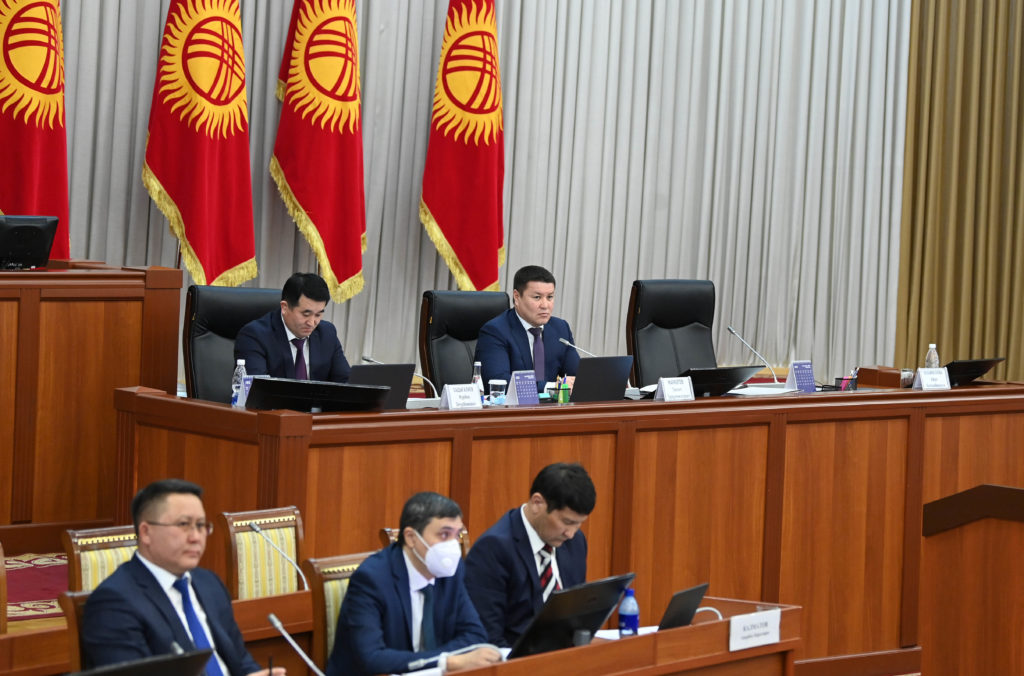It’s official: Kyrgyzstan will choose whether or not to modify its constitution on 11 April. Parliament approved the bill making provisions for a referendum last week and the president, Sadyr Japarov, signed it into law on 12 March. Proponents say the changes will make government more efficient, but many worry they give the president too much power and restrict freedom of speech.
Kyrgyzstan will vote on constitutional amendments on 11 April 2021 according to a new law President Sadyr Japarov signed on 12 March. The Jogorku Kenesh, Kyrgyzstan’s parliament, approved the bill in second and third readings the previous day. 94 MPs voted in favour of the bill and six against.
A draft of the constitutional amendments was first published on 17 November 2020 on the initiative of Sadyr Japarov while he was campaigning for the presidential election. It proved controversial, with activists promptly dubbing it a “Khanstitution” because of the strong powers it gave the president, the Kyrgyz media Kloop.kg reports. Talant Mamytov, the interim president from November 2020 to January 2021, then formed a constitutional council to rework the amendments.
Want more Central Asia in your inbox? Subscribe to our newsletter here.
A referendum followed on 10 January, on the same day as the presidential election, asking voters to choose their preferred form of government. According to the official results, nearly 85% opted for a presidential regime. Just over 11% supported a parliamentary system and a little under 5% voted “against all”. Turnout was 39.12%, above the 30% minimum threshold.
Expanded presidential powers
The proposed amendments increase presidential powers. Article 70 grants the president the power to call a referendum “on their own initiative or on the initiative of at least 300 thousand voters, or on the initiative of a majority of deputies of the Jogorku Kenesh” and to propose new bills in parliament.
The same article also plans for the president to appoint members of the government, appoint and dismiss the chairs of the Constitutional Court and the Supreme Court and their deputies. Under current law, the president already appoints local judges and the procurer general.
The changes would also allow the president to run for a second term, which the current constitution forbids, and reduce the Jogorku Kenesh from 120 to 90 members.
Read more: Rise and fall… and rise: the career of Kyrgyzstan’s Sadyr Japarov
President Sadyr Japarov told Azattyk, the Kyrgyz branch of the American media RFE/RL, that the change was necessary to “establish order”. In his view, in the current system “neither the president, nor the government, nor the parliament, decides anything”, leaving the country at a standstill.
“According to the current Constitution, there are three branches – government, parliament and president. The last 10 years have shown that this has led to an increase in bureaucracy, no one wants to take on the solution of issues,” he said. “The president does everything through the government and parliament, shifts the responsibility unto them. I could do that, too. But in this case, Kyrgyzstan will lose another 5-10 years.”
People’s Kurultai
Another section of the draft provides for the creation of an assembly known as the “People’s Kurultai”, a name derived from a type of council in Turkic culture. It gives “recommendations on the directions of social development” but says little about what this might mean. The kurultai can also recommend the dismissal of members of government, advises the president, and proposes new laws to parliament.
Aksana Ismailbekova, a research fellow at the Leibniz-Zentrum Moderner Orient (ZMO) whose work focuses on kinship and patronage in Kyrgyzstan, explains that in theory the People’s Kurultai is a way to involve the country’s regions and hold officials accountable.
“Ideally, the kurultai will be able to address very important political issues in which representatives of each regional group will take an active part. The idea is that once the kurultai is legitimised, state officials will be required to report annually on their activities, work, and projects to the regional leaders of Kyrgyzstan,” Ismailbekova told Novastan.
But she highlights this is the ideal and practice could be different. “The big question remains whether the country’s current leaders would allow members of the kurultai, once it is legitimized, to objectively control state officials,” she said. “There are also groups of people who distort the essence and meaning of the People’s Kurultai. Some state officials might use the Kurultai as a political tool to gain power.”
The legal aid clinic Adilet, in Bishkek, expresses a more negative point of view in its analysis of the draft constitution, describing the goals and reasons for the creation of the People’s Kurultai as unclear. It also underlines the new assembly could be used to serve the president’s ends: “There are risks of interference and pressure on all institutions of power, as on the civil sector, from the president through the People’s kurultai,” the analysis reads.
Emphasis on “moral and ethical values”
Another contentious part of the draft is article 10, which states: “Events that contradict moral and ethical values and the public consciousness of the people of the Kyrgyz Republic, may be limited by law.” It goes on to say that “the list of activities subject to restriction and the list of restricted access and dissemination of information is established by law” without further detail.
“Article 10 of the Constitution contrains a threat to freedom of speech,” the former lawmaker Ravshan Jeenbekov said in a discussion organised by Azattyk. “It’s dangerous to limit freedom of speech with reference to the preservation of moral values.”
The worry arises despite parts 1-3 of article 10 guaranteeing freedom of expression and media freedom, according to Mars Tulegenov, the head of the media rights organisation Journalist.kg.
“There are points that raise questions. If the constitution is adopted and ‘the rest will be determined by an additional law,’ what laws will be adopted? … We have enough media laws. We don’t need any more,” he said.
A controversial project
Although the amendments are expected to be approved in the referendum, many in Kyrgyzstan have criticised the project from the onset. “We are returning to authoritarianism,” the MP Dastan Bekechev wrote on his Facebook page at the time.
The former president Roza Otunbaeva even stated that after the implementation of such a constitution, international organisations would stop providing aid to Kyrgyzstan, Kloop reported.
Read more: Kyrgyzstan elects Sadyr Japarov and opts for presidential government
In response to criticism, a new Constitutional Council reworked the document. A new version was published on 9 February. Although it notes “positive changes”, Adilet’s analysis of this new document concludes that it “violates the principles of the rule of law and legal certainty, there are internal contradictions of a fundamental nature, as well as incorrect wording of the rules of law”.
Local media also highlights that the parliamentary votes of the draft law establishing the referendum did not follow the correct procedure. Notably, Kloop.kg alleges that although 100 deputies voted, there were only around 80 people in the room at the time, meaning some cast votes on behalf of their colleagues.
A member of the Jogorku Kenesh, Janar Akaev, told journalists lawmakers had voted under pressure. “Those who voted against [the bil] in the first reading were pressured and threatened. Therefore, they did not come to vote today” he said, as quoted by 24kg. “Deputies are afraid to speak openly.”
Aksana Ismailbekova expands on the pressure exerted on parliament in Kyrgyzstan, explaining that, according to her research, many deputies are businessmen. “It is impossible to do business entirely legally in Kyrgyzstan, so the State Committee for National Security has compromising documents and you can’t say anything against it,” she said. “As a result, this parliament cannot be independent when the president has influence on the security sector.”
Valentine Baldassari
For more news and analysis from Central Asia, follow us on Twitter, Facebook, Telegram, Linkedin or Instagram.
 Kyrgyzstan to hold constitutional referendum in April
Kyrgyzstan to hold constitutional referendum in April 



